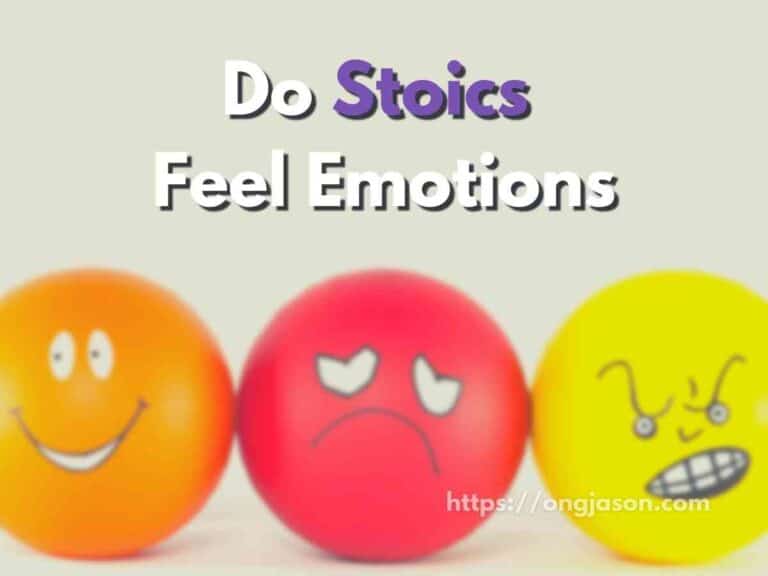Stoicism and Stress: 15 Stoic Ways in Dealing With Stress
I’ve recently been in a stressful situation, and the good news is I know about how Stoics deal with stress. I know how hard it is to face stressful situations, especially if a person doesn’t know what stress is. Stoicism offers an explanation for stress and how the ancient Stoics dealt with them.
The Stoics handle stress by first thinking if the cause of stress is within their control. If the stress is within their control, they solve the problem by facing it with courage and wisdom. On the other hand, if things aren’t in their control, they practice resilience to accept the truth, such as thinking of the worst-case scenario.
In this blog post, I have some tips ancient and modern Stoics have followed in handling stress with wisdom and courage.

1. Understand the Dichotomy of Control
The Stoics believe that everything in life, including stress, can be divided into things in our control and things that aren’t in our control. This concept is called the dichotomy of control.
Going deeper, Stoicism talks about accepting fate.
I’m talking about this because Stoicism understands that stress is a part of life.
The occurrence of the sources of our stresses is normal, and we should accept that it’s the reality.
Feeling stress is natural as it is part of this world. Sometimes, we are going to experience hardships as life is unpredictable.
As a Stoic, you should accept that stress happens, and we should be resilient enough to handle them.
However, that doesn’t mean we can’t do anything about stress because there are aspects of stress we can control.
We need to understand the cause of stress, and we need two things to experience stress which are the stressor and our perception.
Stress is a feeling of emotional or physical tension. It can come from any event or thought that makes you feel frustrated, angry, or nervous. Stress is your body’s reaction to a challenge or demand.
medlineplus.gov
To experience stress, stressors and our perception need to be met.
Stressors are your projects, boss, family, situation, assignments, and external things we usually can’t control.
Your perception, on the other hand, is different. The Stoics believe that how we react to these situations is inside our control.
Since the dichotomy of control is about learning which is in our control and which isn’t, learning that we can control how we react to these emotions is a relief.
This is a sign that we can control stress and why I decided to write how stoics deal with stress.
So, following the dichotomy of control, while we can’t control our stressors, we can control how we react to stress.
We can either react to stress negatively by running away until the problem gets extremely big or respond positively by accepting that stress as a part of life and doing our best to solve our problems.
So, how do stoics react to stress positively? We’ll talk about that in the following sections.
2. Writing Our Worries Down
There are times where we need to vent our feelings out. The problem is since Stoics tend not to expect from other people, they don’t vent their feelings by telling their worries to their friends.
Instead, they write things down either on a piece of paper or by writing in their journals.
Many Stoics have journals where they meditate on the facts of life and where they write their worries.
By getting those feelings out, we can reduce our stress by a considerable amount.
Journaling has been a routine for many Stoics, and if you want to journal, I have a complete guide complete with video and examples. You can find it here: How to reflect on your day.
3. Learn the Purpose of Stress
Stoics deal with stress from a logical perspective. That’s why Stoicism is often tied with people who try always to be rational.
My point here is that learning the purpose of stress is essential in handling them.
The purpose of stress is it prepares us for the challenging times ahead. Pressure helps us focus our energy and attention on the problems we are facing.
When we are stressed, it is hard to think of anything else other than the problem. It is a way for our brains to focus and solve the issue.
Furthermore, stress gives us the energy to handle problems.
However, we aren’t good at classifying this stress whether it is valuable or not.
Feeling stress when handling some problematic task is normal. However, chronic stress is a different story.
When we can’t classify whether our source of stress is valuable or not, our body will always feel stressed, which leads to chronic stress.
That’s why we need to check if the cause of stress is valid, which we’ll find out in the next section.
4. Check if the Stressors are Useful
Some sources of stress aren’t worthy of our time.
For example, stressing over our mistakes is useless except if there are still learnings we can get from our past mistakes.
That’s why Stoics need to be rational in handling these events. Ask yourself if the stress is logical or emotional.
Remember that Stoics try to stay away from too many emotions since it can harm their logical thinking.
So, stay logical and check if the source of your stress is something beneficial or valid.
Sometimes, we only create stress for no apparent reason, and that is possible. Remember that stress can happen due to our perception.
While stress is a part of life, there are times stress is unnecessary. Identify those unnecessary stress and start not minding them.
5. Keep Distance From the Stress and Look
Keeping distance from your stress is helpful to get a rational perspective on the situation.
Sometimes, we get so emotional that we can’t look into stress from a logical perspective.
This came to me a few days ago when I made a mistake caused by my lack of knowledge on the subject.
That time, I blamed myself for why I failed, only to realize that my lack of knowledge caused the mistake.
Since it is a lack of knowledge, I can’t prevent it from happening except if I went back to the past and studied harder.
Since that will not happen, I took the lesson from my mistake and promised never to make the same mistake again.
Instead of complaining, I took my stress and viewed it from a different angle. I looked into the problem from a third-person perspective instead of a first-person.
That way, I can understand my stress from a more logical perspective.
Other people call this method cognitive distancing. This is helpful to get a logical perspective on your stress.
6. Think of the Worst-case Scenario
Thinking of the worst-case scenario is a way to deal with stress, particularly stress that comes from things that can happen in the future. By thinking of the worst-case scenario, we are more resilient in case the worst thing comes. The Stoics call this “Premeditatio Malorum.”
There are times when our source of stress is something that could happen in the future, such as what if you failed the interview, failed the exam, and many more.
This also happened to me when I made my first YouTube video, and my mind kept on telling me what would people say? What would my relatives say? What if my viewers hate me?
However, I thought of the worst-case scenario: I might get a dislike or some gossip from other people.
By understanding and accepting the worst-case scenario, I realized that my fear or stress is illogical, leading me to finally face my fear.
7. Get Busy
Sometimes, when we have nothing to do, we tend to create problems in our heads.
Some of these problems are entirely illogical since most of these come from our perception.
Sometimes, getting busy is a great way to filter these irrelevant sources of stress.
However, be careful since this might cause us to neglect our responsibilities.
Getting busy is an excellent way to be stronger and limit our perception. However, some use this method as a way to escape the problem.
So, like always, be rational and check the cause of stress.
Of course, you can also get busy by not working, such as exercising, meditating, reading a book, and many more. Things that can cause you not to think about the problems.
You can also look for hobbies such as playing the guitar, drawing, and many more.
8. Seek Knowledge
Some of our problems need some knowledge to fix.
For example, when we are having some issues with our car engine, we can have some research on how to diagnose our problem and solve the issue correctly.
This is also true when you’re reading this blog post in hopes of finding ways to solve your stress in a Stoic way.
Nevertheless, learning is essential to Stoics. Therefore, many Stoics tend to read a lot of books and learn from others.
That’s also why Stoicism is famous in the self-help industry.
Remember that there are times where we are stressed because we lack knowledge in solving the problem. It is our mind telling us it’s not ready for the challenge ahead.
Trying to solve the problem by learning relevant things helps handle stress caused by these types of issues.
9. Stop Expecting Things From Others
The Stoics understand that expecting things from others is illogical and should always be avoided.
Expecting others to fix your source of stress puts our expectations on things we can’t control.
Following the dichotomy of control, expecting things from others makes us helpless and feel weak in times of stress.
Instead, don’t expect from others and put the matter into your hands.
Always remember we can’t control what others think, say, or do.
Furthermore, stop caring what others think. While there are times where we need to listen, we often hear a lot.
Remember that it’s your life, and the only person who would sincerely care about you is yourself.
So put the matters into your hands and deal with stress.
Please remember that other people have their issues, so it might be hard for them to help you despite wanting to do so.
10. Accept Fate
The Stoics believe in fate where there will be times life throws us good and bad things. But, unfortunately, these are things we can’t control, and what we can only do is accept the fact, no matter how hard it is.
While it is a good idea to solve things we can control, there are sources of stress we can’t control.
Sometimes, no matter how careful we are, we can have bad days. Life is unpredictable.
On these occasions, we have to face life with courage and wisdom.
Courage is facing reality and wisdom, knowing that there is nothing we can do about it.
Instead of trying to fight a losing battle, sometimes, it is ideal for accepting the fact.
Focus only on the problems you can solve.
11. Think About How Little Our Problems Are
There are times where we feel overwhelmed by our problems, and it seems the world’s problems are all in our hands. However, when we look at a wider angle, we would understand that everyone has issues.
The fact that everyone has problems means that billions of people around the globe have issues on their own.
Our problems are usually a tiny portion of that pie.
Everyone has problems. The only difference is the type of the problem.
For example, a poor person would stress getting money, while a rich person would stress managing their business.
If we see our problem as a tiny portion of the world’s problems, we can gather some courage to face them.
12. Remember to be Grateful
Being grateful is one of the ultimate Stoic solutions to stress. It helps us live a satisfying life despite the world’s unpredictability. It helps us live happily even in times of stress.
When we become grateful for the little things, we begin to see how lucky we are.
For example, being healthy is something we should be grateful for. Having electricity and an internet connection is also something we take for granted.
Focusing on the bad things, such as stress, makes us feel bad about life. However, when we look at the good things, we will see the good things despite the bad things.

13. Have a Routine
Sometimes, we can reduce our stress by having routines.
Simple things such as when to work, when to wake up, when to study, and others are things people stress on, even if they can replace them with routines.
Having a routine or plan is a good idea when it comes to reducing stress.
Research published in the Neuroscience and Biobehavioral Reviews found out that repetitive behavior reduces stress.
Remember that life is unpredictable, but routines give some predictability to life.
Predictability makes us feel at ease of the situation and gives us a sense of power in our life.
This doesn’t mean you’re going to have a complete schedule. Remember that life is still unpredictable. The purpose of a routine is to give some directions to where we are going in life.
14. Realize the Impermanence of Things
Everything, including our problems, have an ending.
Some of our problems can last a long time, but they will also end since things constantly change.
Much like physical objects have an end, our problems would also end.
Knowing that we can start living life to the fullest. This idea will give us hope that the future has something new.
The Stoics believe in the impermanence of things. So understand that our problems, no matter how big it is, is also impermanent.
Accept that we will have bad and good days. It’s a fact of life, and we can’t do anything to change that.
There is always life after stressful situations.
15. Solve the Cause of Stress
There are times where the cause of stress is something within our control. That’s where a Stoic should handle them with courage and wisdom.
For example, if your stress is because you are not prepared for an exam, studying can solve the problem.
While Stoicism offers ways to reduce the number of stressors, it is also about solving these problems if they are within our control.
The purpose of not minding the stressful situations we can’t control is to reduce the number of stressors and focus on the important ones.
Once we can focus on the things we can control, we can feel empowered when solving the cause of our stress.
Remember that Stoicism is not all about accepting the stress and being happy with it. It’s also about knowing which sources of stress we can control and fix it.
Solving our stress and problems often result in a happy and fulfilling life.
What’s next? Do you know how Stoics handle fear? Since fear is related to stress, you might find this blog post interesting: How Stoics Deal with Fear.
Source
- American Friends of Tel Aviv University. “Finding relief in ritual: A healthy dose of repetitive behavior reduces anxiety, says researcher.” ScienceDaily. ScienceDaily, 2 November 2011.

“Only the things I love.“
ongjason.com is reader-supported. When you buy through links on the site, I earn an affiliate commission.
If you’re following me, you’ll know that I believe it is essential to have some tools, whether it’s for personal development or lifestyle in general.
So, here are the things I love.
YouTube
If you want to learn things for free, I recommend watching my YouTube Channel. Click the Button Below to go straight into my Channel. 🙂
Okay, let me first explain my Channel.
I believe that I really can’t explain everything too well on my blog. That’s why I created a YouTube Channel so I can easily explain a lot of things. Plus, I believe that Video Sharing is the future.
Recommended Books
The next thing is books. Books are, for me, one of the cheapest ways to get invaluable information. We can learn personal development, finance, career, relationships, and many more from books.
Here, I will be listing my favorite books in different categories.
- For Beginners – 7 Habits of Highly Effective People by Stephen Covey – Personal development has a lot of concepts and ideas to learn. Thus it can be really hard for beginners to know where to start. Thus, I recommend this book since all the basic concepts of personal development are here(except finance, check what I recommended for that)
- Productivity – The One Thing by Gary Keller – This book teaches us the power of focusing on one thing which is the ultimate source of productivity. The concepts taught are what I am using to constantly publish YouTube videos while maintaining this website.
- Busy? – Make Time by Jack Knapp – This book teaches us how to make time for the things we love. The concept is really simple but I think that makes it a book worth reading.
- Health – Lifespan by Dr.Sinclair – This Book teaches about the latest scientific research on lifespan. In his book, he has shared numerous things he is doing to slow down his aging process. This can be as easy as eating less which he recommends.
- Finance – The Richest Man in Babylon by George Clason – Perhaps one of the first books I’ve read about Finance, this book for me is the best if we are talking about learning basic finance such as basic saving and investing. The concepts are very simple but effective.
Audiobooks
Take this advice as a grain of salt.
I don’t recommend buying Audiobooks one by one. I mean, audiobooks can be quickly finished by listening while working out or doing some mindless tasks.
So here is to save you some money. Just go for a monthly subscription to Audible. I believe that you will save a lot of money with that plus, they usually give freebies to anyone starting.
My Audiobook Recommendation will always be the same as my book recommendations, but I personally like The 5 Second Rule by Mel Robbins. I like how she is so casual while reading her book.






